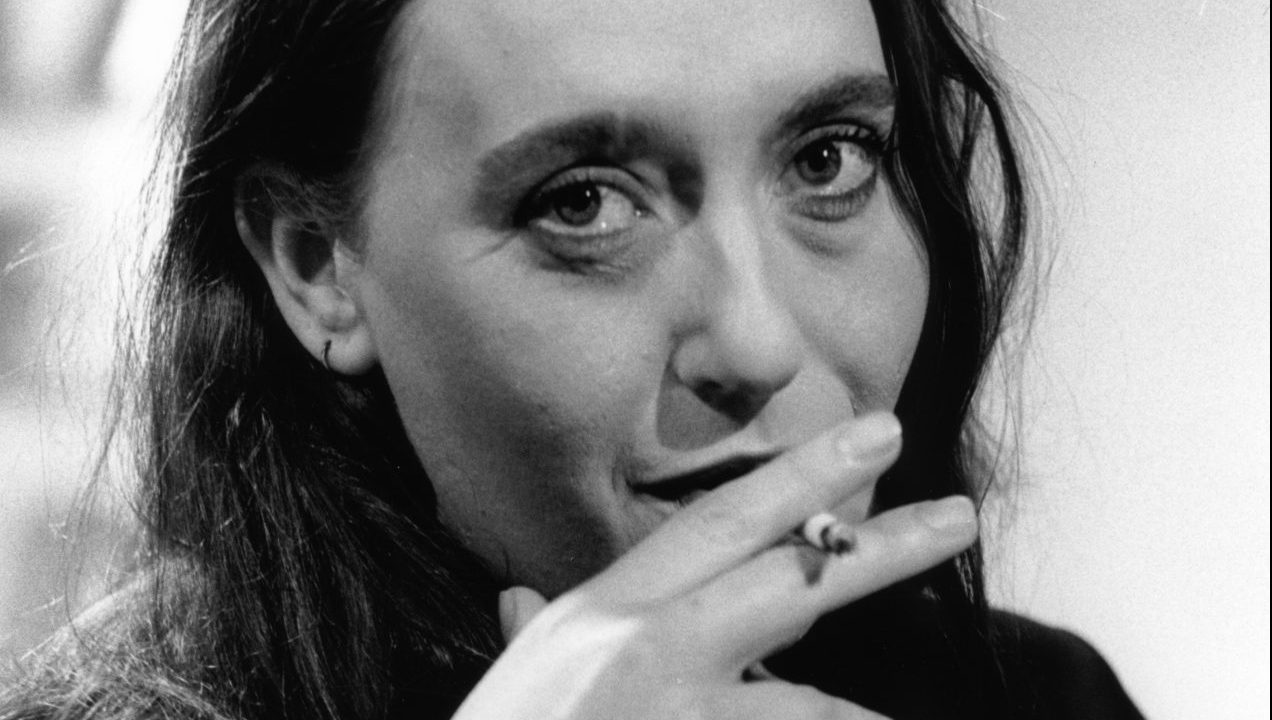The pages of Hello! magazine are rarely filled with the latest trends and developments in translated literary fiction. Fair enough, that’s not what Hello! is for. Yet this unlikeliest of cultural Venn diagram intersections occurred last week when the glossy weekly mused upon an Instagram post by the American model Kaia Gerber.
Gerber had published a photograph of herself in a bikini (“a simple black bikini,” we learn, “complete with tie-knot detailing, a halterneck silhouette and subtle ruching”) lying on what appeared to be a waterside jetty with her face covered by the book she was reading: Dear Dickhead by the French novelist Virginie Despentes.
Gerber, the daughter of Cindy Crawford, is an established literary advocate who launched her own book club, Library Science, at the start of the Covid lockdowns in 2020 with the stated aim of “spotlighting young voices, debut writers, translations, contemporary classics,” and the promise that “you won’t be seeing the typical bestseller list here”.
Gerber’s book club choices have included works by Françoise Sagan, Joan Didion, Ta-Nehisi Coates, Raven Leilani and Marguerite Duras and when in January she streamed an interview with the Iranian-American poet Kaveh Akbar about his debut novel Martyr! the book was catapulted immediately into the New York Times bestsellers’ list.
What attracted Hello!’s attention, other than the subtle ruching, was not Gerber’s selection of one of France’s most innovative and outspoken contemporary novelists, but rather the caption that accompanied the picture of the model holding up her copy of Dear Dickhead, which read “a book for someone I used to know”.
This was, Hello! assured its readers, “a cryptic nod to a past acquaintance”, adding that the model’s 10 million Instagram followers “quickly praised the Valentino muse for her sassy quip”.
Social media thrummed with speculation over the identity of the someone Gerber used to know, albeit the sleuthing was strictly limited to famous people with whom the 22-year-old has been in a relationship with rather than, say, a plumber who didn’t show up.
One person who would have found all this deliciously amusing is the author. In Dear Dickhead, Virginie Despentes turns her attention to this kind of social media squall.
Despentes has always been prepared to tackle head-on the issues about which she feels strongest as well as being open about the often shocking experiences that have helped to form her world view.
An epistolary novel, Dear Dickhead revolves around correspondence between a middle-aged midlist novelist named Oscar Jayack and Rebecca Latté, of similar age and a famous screen actress. While the format and its rummage through contemporary morality invokes comparisons with Pierre Choderlos de Laclos’ 1779 novel Les Liaisons dangereuses, Dear Dickhead is most definitely a 21st-century book, something established in the opening lines.
Oscar posts on Instagram a viciously misogynist attack on Rebecca having seen her sitting outside a cafe, describing the woman who once captivated the hearts of the nation’s males as “now a wrinkled toad” who is “husky, slovenly, faintly repulsive, and that filthy, loud-mouthed persona”.
To his horror, his screed is brought to the attention of Rebecca herself who responds, beginning her detailed summary of Oscar’s faults with “Dear Dickhead” and ending with the hope that “your kids die under the wheels of a truck”.
An everyday story of an internet troll, it seems, but there is more to it than this. A mortified Oscar apologises and reveals that the pair knew each other as children. Rebecca was a friend of his older sister Corinne when all three were growing up in a suburb of Nancy in north-eastern France.
Despentes herself grew up there, enduring an unhappy childhood that saw her sectioned briefly in a psychiatric hospital at the age of 15, departing the town for good two years later for an itinerant late adolescence spent following bands, often sleeping rough and eventually finding work as a stripper in a peep show, writing reviews of pornographic films and doing occasional sex work.
She also found time to write what became her debut novel, Baise-Moi, in which two young women avenge the sexual violence they have suffered by taking a murderous road trip across France. Published in 1993, Baise-Moi was turned seven years later into a film, co-produced by Despentes herself in an adaptation so graphic it became the first film to be banned in France in almost three decades.
A string of novels followed, including the Vernon Subutex trilogy, the first instalment of which was published on the day of the Charlie Hebdo murders in 2015 and has since established Despentes as one of France’s bestselling and most influential literary figures. Dear Dickhead – Cher Connard in the original French – was an instant bestseller when published in France in 2022.
It was soon after her departure from Nancy in the late 1980s, however, that a 17-year-old Despentes endured the horrific experience that would define her life and work: being raped by three men while hitchhiking.
“It is a founding event,” she said in her 2006 book-length feminist essay King Kong Théorie. “Of who I am as a writer, and as a woman who is no longer quite a woman.”
Dear Dickhead, certainly in its tone and themes, feels a little like a fictional extension of King Kong Théorie.
“I am writing as an ugly one for the ugly ones: the old hags, the dykes, the frigid, the unfucked, the unfuckables, the neurotics, the psychos, for all those girls who don’t get a look-in in the universal market of the consumable chicks,” she wrote in 2006. “I am writing as a woman who is always too much of everything – too aggressive, too noisy, too fat, too rough, too hairy, always too masculine, I am told.”
There are strong echoes of Rebecca in Despentes’s refusal to conform to the male gaze and the patriarchy that sits behind it, and King Kong Théorie was praised as a landmark text when it was published.
“I am not remotely ashamed of not being a hot sexy number but I am livid that – as a girl who doesn’t attract men – I am constantly made to feel as if I shouldn’t even be around,” she wrote. “We have always existed, and never spoken. Even today, when women publish lots of novels, you rarely get female characters that are unattractive or plain, unsuited to loving men or to being loved by them.”
Dear Dickhead goes a considerable way towards putting this right by presenting the situation viewed through the eyes of characters at opposite ends of the debate, brought together first by trolling misogyny, and then by personal history.
Oscar is unquestionably a dickhead, a dickhead so colossal he would be visible to the stranded astronauts on the Boeing Starliner. Aware of some flaws but blind to most, when he and Rebecca begin what becomes a voluminous correspondence Oscar has just been cancelled after a feminist blogger named Zoë reveals that when she worked as a young publicist at Oscar’s publisher she was subjected to a long campaign of sexual harassment by the novelist.
“I’d throw up before I left for work,” she wrote, “but I’d smile and say bonjour monsieur like nothing had happened because if I shouted I was a hysteric who couldn’t control herself.”
At the time Oscar was at the peak of his success while Zoë was a newcomer at the bottom rung of the publishing ladder.
“All they could see was the quaint irony of the situation. The big macho author and the little PR girl.”
Oscar of course claims innocence, he was simply in love with Zoë.
“What Zoë was intending to call assault was just me being a bit too flirtatious with her,” he complains, despite Zoë’s career being ended by his actions.
Oscar’s deep-set misogyny is exposed whenever a female acquaintance refuses to tell him what he wants to hear. When a female former editor warns him of the coming storm and he insists on his innocence, she reminds him of how when giving interviews he would often talk about her breasts. Immediately he becomes “tired of listening to this bitch”.
When he unburdens himself to a female neighbour he is delighted when, at first, she tells him he’s innocent, that Zoë’s crazy and is simply out to destroy him.
“Problem one,” she adds, “that’s the same bullshit excuse spouted by every stalker rapist predator in your world. The way you guys see it, you’re all innocent.”
Oscar leaves, informing the woman she is “a sanctimonious snowflake”.
Such exchanges put the reader in mind of Despentes’s 2020 open letter to the male-dominated French Film Academy when they gave best director at the Césars, France’s biggest film awards, to Roman Polanski.
“Yes,” she wrote afterwards in Libération, “we are dumb bitches, we are the ones who have been humiliated, yes, we only have to shut our mouths and take your blows, you’re the boss, you have the power and the arrogance that goes with it, but we will not remain seated without saying anything. You do not have our respect. We’re getting the hell out. Enjoy your bullshit on your own.”
Initially it is difficult to get past why Rebecca would engage so fully with Oscar, but what underpins the exchanges and comes to unite them, or at least keep the correspondence going, is isolation. Oscar is cut off by his disgrace, Rebecca has been jettisoned by the film industry since her youthful beauty faded.
“You want to know what it’s like to be cancelled?” she asks him. “Talk to any actress my age.”
Both come from the same working-class background in the same city, and both have forged their own very different paths, each suffering the resultant snobbery in chosen fields where neither ever felt truly accepted. Both have histories of addiction and both are experiencing the results of developments they are powerless to stop – Oscar’s entirely self-inflicted, Rebecca’s the result of a system that facilitates actions like Oscar’s.
What sets Despentes’s novels apart, however, for all their anger and frequent bleakness, is the persistent possibility of redemption. It’s there for both these unreliable narrators and it’s there for Zoë, too, in a book that shows Despentes at her very best: incisive, intelligent and fearless. There is justifiable anger at the heart of Dear Dickhead, but it’s a clear-eyed and channelled anger that never overpowers the nuance necessary to create this valuable distillation of complex contemporary morality, which all of us will recognise.
Kaia Gerber will not be the only reader to find Dear Dickhead to be a book for someone she used to know.
Dear Dickhead by Virginie Despentes, translated by Frank Wynne, is published on September 12 by MacLehose Press, price £18.99




